In The Name Of Jesus ? Who ? Most Evil Christians In World King James Bible 1611
In The Name Of Jesus ? Who ? Out of all the gangsters, serial killers, mass murderers, incompetent & crooked politicians, spies, traitors, and ultra left-wing kooks in all of American history,” asked a conservative and have you ever wondered who the worst of the worst In The Name Of Jesus ? Who ? and I was shocked to hear about John MacArthur, Voddie Baucham, Joel Osteen, TD Jakes, Steven Furtick, Joyce Meyer, Kenneth Copeland, Oprah Winfrey, Mike Todd, Andy Stanley, Hillsong Music, Carl Lentz, Bethel Music, Bill Johnson, Benny Hinn, Creflo Dollar, Jesse Duplantis, Paula White, Justin Peters, Paul Washer, Todd White, Brandan Robertson, Kathryn Krick, Todd Bentley, Sid Roth, Kat Kerr, Rob Bell, David Oyedepo, Rodney Howard Browne, Chris Oyakhilome, Shepherd Bushiri, Heidi Baker, Che Ahn, Lou Engle, Oral Roberts, and John Hagee.
Jesus,” which later employed the letter “J,” is a derivation It was not until 1630 that the differentiation became general in England.” Note in the original 1611 version of the King James Version of the Bible there was no “J” letter in this Bible for because it did not exist. James was spelled Iames. Jesus was spelled Iesous. The 80 books of the King James Version include 39 books of the Old Testament, 14 books of Apocrypha, and the 27 books of the New Testament.
The Letter “J” did not Exist - https://ia800703.us.archive.org/33/items/kjvkingjamesbibl1611lman/kjvkingjamesbibl1611lman.pdf - The Son of Elohim was not a White Guy with an English Name, speaking Greek
One of the most asked questions of the century. How can the Messiah’s Name be Jesus if the letter “J” did not exist 500 years ago?
The Messiah walked on earth about 2,000 years ago. If the letter and sound of “J” did not exist when the Messiah walked on this earth, what was His Name?
In the English Alphabet, the letter “J” was originally used for the letter “I”. The first to distinguish the difference between the letter “J” and the letter “I” was in Gian Giorgio’s 1524 “I” and “J” were originally the same letter but different shapes both equally the same letter.
According to the history of the English Alphabet, the official and original sound of the letter “J” was the sound of “Y” in “yet” or “yellow”.
The very first English-language book to make clear distinction between the sound of “I” and the sound of “J” was not written until 1634. It wasn’t until then, after the 1611 Bible was published, that the English language officially accepted the shape and sound of the letter “J” as “jay” and no longer the “yuh” “Y” sound.
Jehovah or Jesus are Man made Names, with Man Made Doctrines. Tricked, Bait & Switch. Now after Reading this Post, you are No Longer Tricked. From this Point on you’re making a Choice who to follow.
A Savior Created by the Church of Constantine the Great; “Let us then have nothing in common with the detestable Jewish crowd; for we have received from our Savior a different way.”
This is not the Savior Yahu’sha, this is a different one, that is followed a different way, his name is Jesus. The one we are warned would came in His name, the one told you would accept, while you reject the True Master. We were Warned and we Can see just how True it is.
King James 1566-1625 The Black King Who Had The Bible Translated Into English
King James, was the 1st King of England born 1566-1625 and he was the first to rule Scotland and Northern Island at the same time. In 1603 he commissioned a scholars to have the bible translated into English and make it available to all English speaking people throughout the world. It’s a little known fact that he was a Black man who ruled these countries in Europe. During his time he was though to be one of if not the greatest leader of his time. King James, a Black Man.
King James I of England and VI of Scotland, 1619. James (1566-1625) acceded to the Scottish throne in 1567, and to the English throne in 1603 on the death of Elizabeth I. He was the son of Mary, Queen of Scots and Henry, Lord Darnley. James, an educated and able king, desired to bring peace to war-torn Europe. He is probably best remembered for commissioning an English translation of the bible, published in 1611, and still known as the King James Bible.
Historical Context Facts about the Slave Trade and Slavery. King James 1566-1625 So Black King Who Had The Bible Translated Into English also Signed The First Charter for the New World in 1619 Black Slave Trade and Slavery. (Yes a Black Man and King)
The Middle Passage was dangerous and horrific. The sexes were separated; men, women, and children were kept naked, packed close together; and the men were chained for long periods. About 12 percent of those who embarked did not survive the voyage.
Well over 90 percent of enslaved Africans were sent to the Caribbean and South America. Only about 6 percent of African captives were sent directly to British North America. Yet by 1825, the US population included about one-quarter of the people of African descent in the Western Hemisphere.
The 1619 Project (Slave Trade and Slavery. Black King James 1566-1625) is a long-form journalism endeavor developed by Nikole Hannah-Jones, writers from The New York Times, and The New York Times Magazine which "aims to reframe the country's history by placing the consequences of slavery and the contributions of Black Americans at the very center of the United States' national narrative.
Black Kings and Queens the Rulers of England From 1603/1901 Historians Never Talk?
So Moorish and Black Kings and Queens the Rulers of England and Europe From 1603/1901 You may have heard of these England and European Emperors, Kings and Queens, but did you know that they were Black ? So England /American after 1776? So Slavery Trade began 400 years ago this month. Started by Black King James I and VI of Scotland 1603 -1625 signed into law by this king ? This is referred to as the country’s original sin, but it is more than that It is the country’s true origin. Ancient Europe is not what we've been taught. Many things have been whitewashed, especially its ancient History. Here are some facts that you probably didn't know. President Abraham Lincoln, the Melungeon or Tawny Moor was the President of the United States. As President, he has to balance the Moorish side and the European side.
Monarchs of England, Wales and Ireland
ELIZABETH I 1558-1603
The daughter of Henry VIII and Anne Boleyn, Elizabeth was a remarkable woman, noted for her learning and wisdom. From first to last she was popular with the people and had a genius for the selection of capable advisors. Drake, Raleigh, Hawkins, the Cecils, Essex and many many more made England respected and feared. The Spanish Armada was decisively defeated in 1588 and Raleigh’s first Virginian colony was founded. The execution of Mary Queen of Scots marred what was a glorious time in English history. Shakespeare was also at the height of his popularity. Elizabeth never married.
British Monarchs
THE STUARTS
JAMES I and VI of Scotland 1603 -1625
James was the son of Mary Queen of Scots and Lord Darnley. He was the first king to rule over Scotland and England. James was more of a scholar than a man of action. In 1605 the Gunpowder Plot was hatched: Guy Fawkes and his Catholic friends tried to blow up the Houses of Parliament, but were captured before they could do so. James’s reign saw the publication of the Authorised Version of the Bible, though this caused problems with the Puritans and their attitude towards the established church. In 1620 the Pilgrim Fathers sailed for America in their ship The Mayflower.
When Was The Letter “J” Invented? (And Was It Before Jesus?) Some of you may be aware that the letter J is one of the more recent additions to our alphabet. But when was it invented? And what was language like before it came into existence?
When Was The Letter “J” Invented?
The Letter J was invented for the Italian language by a man called “Gian Giorgio Trissino” in the year 1524. It was used in Roman Numerals, but back then, it was an alternative way of writing I, not its own letter. Before the letter J, Jesus’ name was pronounced “Yeh-Soos”.
The History Of The Letter J
Let’s go over the history of the letter J and see how it went from being an alternative version of I to its own letter.
In the year 1524, Italian Gian Giorgio Trissino was the first to use J as a letter. The sound that this new letter would make has another common way of being written “dg“. Due to the influence that Latin and French had on Italian, the letter J was just another way of writing “dg”.
However, back then, the usage of J was far from common, even in Italy, and it wouldn’t be until much later that it would become as recognisable as it is today. It’s unlikely he would have lived long enough to see his new letter become popular.
Much later in the 16th century, a Frenchman called Pierre Ramous was the next person to separate I from J. Back then, words that today we would spell with a J would have been spelt with an I. But, this was only amongst a few French scholars.
It wasn’t until the 17th century that the letter J became common in English. If you read some of the older versions of the King James Bible, you will see the letter I where today’s version has the letter J.
What Was Jesus’ Name Before The Letter J?
Did you know that Jesus’ name wasn’t actually Jesus?
When he was alive, the letter J did not exist. And his name was “Yeshua”. This name is the same place that we get the name “Joshua” from.
The reason why modern English translations use Joshua and Jesus as two separate names is to separate the two to prevent people from getting them mixed up.
Before the Letter J was invented, to translate the Hebrew name “Yeshua” into English would have given you Yesus. This is what Jesus was known as for most of English history.
Most of the names we give people in the Bible are not their actual names.
Yahweh Vs Jehovah: What Is God’s Real Name?
If you read Christian literature, there will be two names that God tends to be given. One of them is Jehovah and the other is Yahweh. The reason why God seems to have two names is that his original Hebrew name has been translated differently.
In the Bible, his name is “הֹוָה Yəhōwā,”. When spelt out phonetically, this name sounds like Yahweh.
However, if you were to take the letters of his original name, and turn them into Latin letters, his name is closer to Jehovah.
Because the Bible wasn’t written in English, it can be translated in multiple different ways.
The Letter J In Roman Numerals
Before J was a letter, it was an alternative way of writing I in Roman numerals. In Roman numerals, they would use letters like I, X, and V instead of numbers.
But sometimes, when there was no longer going to be any I’s, people would put a J at the end of the number instead of a final I. Therefore XIII and XIIJ were different ways of writing the number 13.
How to Pronounce Jesus, Jose, and Juan in Spanish I'll never forget it. One day after returning home from my Spanish class in high school, my mother was on the phone, talking to her colleague.
"Hey GEE-sus! Remember to fax me the accounting documents by tomorrow", I really need it.
Cringe. (Hint: It's not pronounced like that.)
I could almost hear the sigh on the other end of the phone. Here's a guide to pronouncing common Spanish first names, so that you'll never have another embarrassing introduction again.
1. How to Pronounce Jesus
Note: Jesús is spelled with an accent on the final 'u' because of Spanish accent rules. However, oftentimes in the United States the accent is ommitted. The omission does not change the pronounciation of the name.
Here in California, this is probably the most mispronounced hispanic name. Jesus accounts for 0.2% of male births in the United States according to the Social Security Administration. In fact, globally it is as popular as the female name Jessica.
In almost all situations, the Spanish name Jesus is pronounced "hay-SOOS". The J is pronounced just like an "H" sound in English. The Spanish 'u' vowel is similar to the pronounciation of the double O in the word "moon".
Searching for the name online results in videos where the name isn't pronounced until a few seconds in, so I'll save you the time. Here's a link to someone on YouTube saying the name accurately.
Jesus is a popular Latin American name owing to the popularity and widespread nature of Catholicism in Latin American countries. An entire 82.7% of Mexicans are Catholic; somewhere between 70-90% of Argentines are Catholic; around 73% of Spaniards are Catholic, and the list goes on across the Spanish-speaking world.
Compare this to the relative infrequency of Protestant names such as Matthew (Mateo) and Luke (Lucas) in Latin America compared to the United States and Europe.
2. How to Pronounce Jose
Note: In the same way as Jesús the final accent on the word José is frequently ommitted in everyday use in the United States. This omission does not change the pronunciation of the word.
First of all, the incorrect way to pronounce José is to say "Joe's", like the popular grocery store.
Instead, say "hoe-ZAY". A live demo can be found here.
José comes from Saint Joseph a prominent figure in Catholicism and the wife of Mary, the mother of Jesus.
3. How to Pronounce Juan
The picture above is Juan Rulfo, the author of Pedro Páramo, one of my favorite books of all time and a masterpiece of Latin American literature.
Juan, too, is a Catholic name, derived from the name "John", one of the Gospels in the Bible.
Juan is pronounced "WHOOAHN" in one syllable. For a recording of someone saying it, here you go.
Beyond Names
These three Latin American names are commonly mispronounced in Spanish, particularly for English speakers who try to pronounce things phonetically.
Spanish language pronunciation is a tricky thing to handle. Even though letters are pronounced the same way they are spelled, learning the pronunciation rules is often not enough to achieving fluency.
Fortunately, the pronunciation lessons do not end here.
All three names begin with a 'J', which should enforce the pronunciation rule to never pronounce the sound like the soft 'G' in Spanish. For more insights like this,
Speech ling is a website that incorporates hundreds of sentences (along with names) with real vocal coaches that will correct your mistakes.
1611 BOOK NAME IN TABLE OF CONTENTS 1611 BOOK NAME IN TEXT
Genesis
THE FIRST BOOKE OF MOSES, called Genesis.
Exodus
THE SECOND BOOKE OF Moses, called Exodus.
Leuiticus
THE THIRD BOOKE OF Moses, called Leviticus.
Numbers
THE FOURTH BOOKE OF Moses, called Numbers.
Deuteronomie
THE FIFTH BOOKE OF Moses, called Deuteronomie.
Ioshua
THE BOOKE OF Ioshua.
Iudges
THE BOOKE OF Iudges.
Ruth
THE BOOKE OF Ruth.
1. Samuel
THE FIRST BOOKE of Samuel, otherwise called, The first Booke of the Kings.
2. Samuel
THE SECOND BOOKE of Samuel, otherwise called, The second Booke of the Kings.
1. Kings
THE FIRST BOOKE OF the Kings, commonly called The third Booke of the Kings.
2. Kings
THE SECOND BOOKE OF the Kings, commonly called The fourth Booke of the Kings.
1. Chronicles
THE FIRST BOOKE of the Chronicles.
2. Chronicles
THE SECOND BOOKE of the Chronicles.
Ezrah
EZRA.
Nehemiah
THE BOOKE OF Nehemiah.
Ester
THE BOOKE OF Esther.
Iob
THE BOOKE OF Iob.
Psalmes
THE BOOKE OF Psalmes.
Prouerbs
THE PROVERBES.
Ecclesiastes
ECCLESIASTES, or the Preacher
Song of Solomon
The Song of Solomon.
Isaiah
THE BOOKE OF THE Prophet Isaiah.
Ieremiah
THE BOOKE OF THE Prophet Ieremiah.
Lamentations
The Lamentations of Ieremiah.
Ezekiel
THE BOOKE OF THE Prophet Ezekiel.
Daniel
THE BOOKE OF Daniel.
Hosea
HOSEA.
Ioel
IOEL.
Amos
AMOS.
Obadiah
OBADIAH.
Ionah
IONAH.
Micah
MICAH.
Nahvm
NAHVM.
Habakkvk
HABAKKVK.
Zephaniah
ZEPHANIAH.
Haggai
HAGGAI.
Zechariah
ZECHARIAH.
Malachi
MALACHI.
Matthew
THE GOSPEL ACCORDING to S. Matthew.
Marke
The Gospel according to S. Marke.
Luke
The Gospel according to S. Luke.
Iohn
The Gospel according to S. John.
The Actes
THE ACTES OF the Apostles.
The Epistle to the Romanes
THE EPISTLE OF PAVL THE Apostle to the Romanes.
1. Corinthians
THE FIRST EPISTLE of Paul the Apostle to the Corinthians.
2. Corinthians
THE SECOND EPISTLE of Paul the Apostle to the Corinthians.
Galatians
THE EPISTLE OF Paul to the Galatians.
Ephesians
THE EPISTLE OF PAVL THE Apostle to the Ephesians.
Philippians
THE EPISTLE OF PAVL THE Apostle to the Philippeans.
Colossians
THE EPISTLE OF PAVL THE Apostle to the Colossians.
1. Thessalonians
THE FIRST EPISTLE OF Paul the Apostle to the Thessalonians.
2. Thessalonians
THE SECOND EPISTLE OF Paul the Apostle to the Thessalonians.
1. Timotheus
THE FIRST EPISTLE of Paul the Apostle to Timothie.
2. Timotheus
THE SECOND EPISTLE of Paul the Apostle to Timothie.
Titus
THE EPISTLE OF Paul to Titus.
Philemon
THE EPISTLE OF Paul to Philemon.
To the Hebrewes
THE EPISTLE OF PAVL the Apostle to the Hebrewes.
The Epistle of Iames
THE GENERALL Epistle of Iames.
1. Peter
THE FIRST EPISTLE generall of Peter.
2. Peter
THE SECOND EPISTLE generall of Peter.
1. Iohn
THE FIRST EPISTLE generall of Iohn.
2. Iohn
The second Epistle of Iohn.
3. Iohn
The third Epistle of Iohn.
Iude
THE GENERALL Epistle of Iude.
Reuelation
THE REVELATION of S. Iohn the Diuine.
1. Esdras
I. ESDRAS.
2. Esdras
II. ESDRAS.
Tobit
TOBIT.
Iudeth
IVDETH.
The rest of Esther
THE BOOKE OF Esther.
Wisedome
The Wisdome of Solomon.
Ecclesiasticus
THE WISDOME OF Iesus the sonne of Sirach, Or Ecclesiasticus.
Baruch
BARVCH.
Epistle of Ieremiah
The Epistle of Ieremie.
The song of the three children.
The Song of the three holy children, which followeth in the third Chapter of Daniel after this place, [And they walked in the midst of the fire, praising God, and blessing the Lord. ] That which followeth is not in the Hebrew; to wit, [Then Azarias stood vp vnto these wordes, [And Nabuchodonofor.]
The story of Susanna.
The historie of Susanna, set apart from the beginning of Daniel, because it is not in Hebrew, as neither the narration of Bel and the Dragon.
The idole Bel and the Dragon.
The history of the destruction of Bel and the Dragon, cut off from the end of Daniel.
The prayer of Manasseh.
The prayer of Manasses King of Iuda, when he was holden captiue in Babylon.
1. Maccabees
The first booke of the Maccabees.
2. Maccabees
The second booke of the Maccabees.
https://www.kingjamesbibleonline.org/Bible-Books/1611-KJV-Original-Book-Names.php
To the most high and mightie Prince, James by the grace of God King of Great Britaine, France and Ireland, Defender of the Faith, &c. The translators of The Bible, wish Grace, Mercie, and Peace, through Jesus Christ our Lord.
https://www.kingjamesbibleonline.org/1611-Bible/1611-King-James-Bible-Introduction.php
Great and manifold were the blessings (most dread Soveraigne) which Almighty GOD, the Father of all Mercies, bestowed upon us the people of ENGLAND, when first he sent your Majesties Royall person to rule and raigne over us. For whereas it was the expectation of many, who wished not well unto our ZION, that upon the setting of that bright Occidentall Starre Queene ELIZABETH of most happy memory, some thicke and palpable cloudes of darkenesse would so have overshadowed this land, that men should have bene in doubt which way they were to walke, and that it should hardly be knowen, who was to direct the unsetled State: the appearance of your MAJESTIE, as of the Sunne in his strength, instantly dispelled those supposed and surmised mists, and gave unto all that were well affected, exceeding cause of comfort; especially when we beheld the government established in your HIGHNESSE, and your hopefull Seed, by an undoubted Title, and this also accompanied with Peace and tranquillitie, at home and abroad.
King James, was the 1st King of England and he was the first to rule Scotland and Northern Island at the same time. In 1603 he commissioned a scholars to have the bible translated into English and make it available to all English speaking people throughout the world. It’s a little known fact that he was a Black man who ruled these countries in Europe. During his time he was though to be one of if not the greatest leader of his time. King James, a Black Man.
James I, (born June 19, 1566, Edinburgh Castle, Edinburgh, Scotland—died March 27, 1625, Theobalds, Hertfordshire, England), king of Scotland (as James VI) from 1567 to 1625 and first Stuart king of England from 1603 to 1625, who styled himself “king of Great Britain.” James was a strong advocate of royal absolutism, and his conflicts with an increasingly self-assertive Parliament set the stage for the rebellion against his successor, Charles I.
James was the only son of Mary, Queen of Scots, and her second husband, Henry Stewart, Lord Darnley. Eight months after James’s birth his father died when his house was destroyed by an explosion. After her third marriage, to James Hepburn, 4th earl of Bothwell, Mary was defeated by rebel Scottish lords and abdicated the throne. James, one year old, became king of Scotland on July 24, 1567. Mary left the kingdom on May 16, 1568, and never saw her son again. During his minority James was surrounded by a small band of the great Scottish lords, from whom emerged the four successive regents, the earls of Moray, Lennox, Mar, and Morton. There did not exist in Scotland the great gulf between rulers and ruled that separated the Tudors and their subjects in England. For nine generations the Stuarts had in fact been merely the ruling family among many equals, and James all his life retained a feeling for those of the great Scottish lords who gained his confidence.
The King James Version (KJV), also the King James Bible (KJB) and the Authorized Version (AV), is an Early Modern English translation of the Christian Bible for the Church of England, which was commissioned in 1604 and published in 1611, by sponsorship of King James VI and I. The 80 books of the King James Version include 39 books of the Old Testament, 14 books of Apocrypha, and the 27 books of the New Testament. Noted for its "majesty of style", the King James Version has been described as one of the most important books in English culture and a driving force in the shaping of the English-speaking world.
The KJV was first printed by John Norton and Robert Barker, who both held the post of the King's Printer, and was the third translation into English language approved by the English Church authorities: The first had been the Great Bible, commissioned in the reign of King Henry VIII (1535), and the second had been the Bishops' Bible, commissioned in the reign of Queen Elizabeth I (1568). In Geneva, Switzerland, the first generation of Protestant Reformers had produced the Geneva Bible of 1560 from the original Hebrew and Greek scriptures, which was influential in the writing of the Authorized King James Version.
https://en.wikipedia.org/wiki/King_James_Version
In January 1604, King James convened the Hampton Court Conference, where a new English version was conceived in response to the problems of the earlier translations perceived by the Puritans, a faction of the Church of England.
James gave the translators instructions intended to ensure that the new version would conform to the ecclesiology, and reflect the episcopal structure, of the Church of England and its belief in an ordained clergy. The translation was done by six panels of translators (47 men in all, most of whom were leading biblical scholars in England) who had the work divided up between them: the Old Testament was entrusted to three panels, the New Testament to two, and the Apocrypha to one. In common with most other translations of the period, the New Testament was translated from Greek, the Old Testament from Hebrew and Aramaic, and the Apocrypha from Greek and Latin. In the 1662 Book of Common Prayer, the text of the Authorized Version replaced the text of the Great Bible for Epistle and Gospel readings (but not for the Psalter, which substantially retained Coverdale's Great Bible version), and as such was authorized by Act of Parliament.
Daniel Wallace is a noted Greek scholar and professor of New Testament at Dallas Theological Seminary. In his paper entitled “Why So Many Versions?” Wallace makes the following statement -“...we must remember that the King James Bible of today is not the King James of 1611. It has undergone three revisions, incorporating more than 100,000 changes!”
This writer made a very interesting argument. He had details and, though I would say that the tone of his letter was certainly less than charitable, I thought that the content needed some investigation. To begin with, I did not personally count 100,000 changes between the 1611 KJV and the modern reprints. But I did take the word from some reputable scholars on that score. Second, this gentleman’s own statistics show that the count of 100,000 could not possibly be attributable to font changes alone: if so, then there should be nearly 791,328 changes (according to this gentleman’s word-count of the total words in the KJV [a number which, by the way, may include part of the Apocrypha1]). Third, since this gentleman has included rather minor changes (which I also assumed to be part of the 100,000 changes)—specifically, “printing errors, spelling standardization, and a few minor phrase changes” (though he considers these to be among the biggest of the 421 changes), we can proceed on his definition of an alteration. In particular, spelling standardization is the largest single group of changes made between 1611 and the modern era.
How can we proceed with this comparison? I have on the wall in my study two leaves from the 1611 edition—the first edition—of the King James Bible. The following text, 2 Samuel 12:20-31, is part of a leaf from the 1611 printing of the KJV. There are a total of 362 words in these verses. This ought to be a good test-case for whether there are 421 total changes or 100,000 changes to the KJV in its nearly 400-year history. Only 421 changes to the KJV equals an average of one change per 1880 words. Therefore, we should expect to find none in these twelve verses, statistically speaking (or, more precisely, about one-sixth of one change). If, on the other hand, there are 100,000 changes to the KJV, that averages out to one out of nearly eight words (1:7.91328 is the precise ratio), or 45.745 words.2 Thus, if my statistics are correct, we should expect to find one or more instances per verse, on average, and a grand total in the double digits. If Scott’s statistics are correct, to find more than one or two would be disturbing, and to find even a dozen or more would show that his data are fundamentally incorrect. To be sure, this is hardly a scientific sampling; but at the same time since the two statistical models are so widely divergent from one another, we might expect to see either pattern emerge.
Appendix
Three other points can be made here. First, Scott’s statistics are probably an amalgam of global changes and individual changes. That is, most of the 421 changes that he sees in the KJV are groups of changes. The change of ‘towards’ to ‘toward’ that occurs fourteen times is thus counted as one change. (In the five words he lists, the total number of changes comes out to 214 changes.) The problem with this is that we are led to believe that those 421 changes represent a specific percentage of the whole—or, in Scott’s words, “five one-hundredths of one percent.” That would only be true if there were 791,328 different words (as opposed to total words) in the KJV.
Second, when Scott details a handful of changes that are indeed trivial, he says, “Friends, this is the ENTIRE extent of the nature of the changes from the King James Bible of 1611 to the King James Bible of the present day.” As we mentioned above, that is not correct. Some of the changes in the KJV through the centuries have been fairly significant. The most famous blunder in the history of the King James Bible to come off the printing press was the 1631 edition. Robert Barker, the printer to the throne, inadvertently left out “not” in the seventh commandment! It was dubbed “the Wicked Bible” and Barker was fined 300 pounds for the error.4
Now, someone might object: “But that’s a printer’s error; that shouldn’t count.” There are two problems with this. First, errors creep into copies of a book, especially one that is nearly a million words long! Whether those errors crept into handwritten copies or printed copies, the principle is still the same. This, indeed, is one reason why the vast bulk of biblical scholars reject the KJV as the best translation available today and why they reject its underlying Greek text as being identical with the original: errors in the transmissional process have always taken place, and a great number of them are self-evident in the KJV tradition. Second, the problem is that the Bible that people have in their hands always have a small percentage of printing errors. Some of them are rather minor, some are major. But KJV-only advocates typically link inspiration to preservation to accessibility in such a way that logically makes printer’s errors a part of the package.
-
 9:16
9:16
Bible For Overcomers
1 year agoThe Bible, Nimrod, and Antichrist #jesus #god #bible #prayer #church #christian #faith #lord #sin
751 -
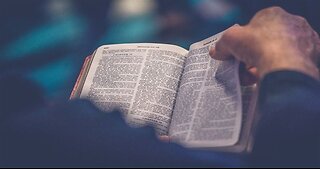 25:30
25:30
Eternal Affairs Media ™
7 months agoThe Name of Jesus - Yeshua in The Old Testament
1651 -
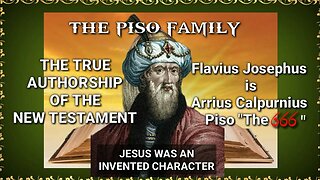 53:46
53:46
SergeantSchultz
1 year agoNew Testament Bible Authored by the Arius Calpurnius Piso, Pen Name "Flavius Josephus"
250 -
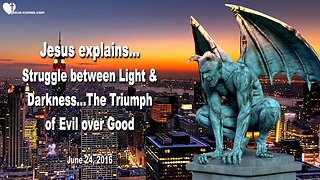 9:33
9:33
News from Jesus
10 months agoJune 24, 2016 ❤️ Jesus explains the Destruction of America... Struggle between Light and Darkness and the Triumph of Evil over Good
347 -
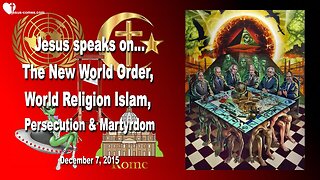 14:27
14:27
News from Jesus
1 year agoDec 7, 2015 ❤️ Jesus speaks about the New World Order, One World Religion, Persecution and Martyrdom
187 -
 8:27
8:27
The Truth Is Hated To Those Who Hate The Truth!
6 months agoAntichrist | The Leader Of The New World Order - The Most Evil Man You Will See.
4823 -
 22:08
22:08
ChristianRapture
1 year agoReal Christian respect Jesus & fake Christian buddies with Sananda Jesus lead to Draco gay pedophile
1.02K1 -
 29:41
29:41
Prepare For The Apocalypse
1 year agoThe New Jerusalem - Jesus Christ's 1000 Year Reign - The Great White Throne Judgment
584 -
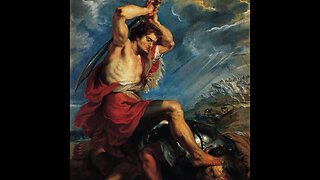 1:20:59
1:20:59
vietrandy
7 months agoWhich King James Bible Version would I recommend?
816 -
 10:02
10:02
The Truth Is Hated To Those Who Hate The Truth!
1 year agoThe Most Evil Christians in the World
1.15K